Website Design – How Consumer Experience Can Convert Visitors Into Customers
With social media and search marketing, both trending in the digital news, website design and consumer experience have taken a backseat in mind space. However, these are critical and a first step to getting your digital strategy right. And here is why.
Almost every client we have worked with since end-2004 when we first made our website, has wanted to hire our services because they liked what they saw on our website.
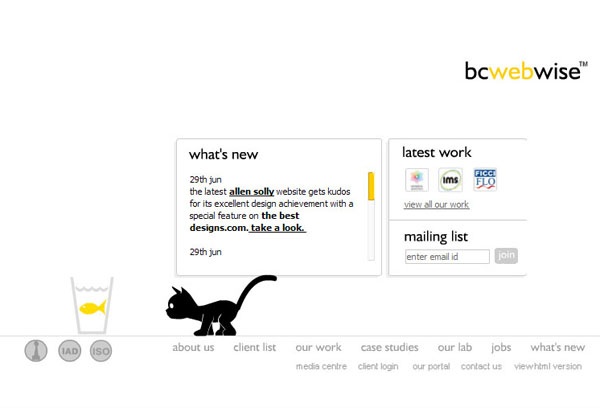
In 2004 we had very little content that we could showcase as a portfolio. So we put up what we thought we were good at, ideas that looked good and could engage the audience as a part of our user experience design (UED). It worked. Anyone who visited the website instantly fell in love with the fish n cat animations that we had as a part of the UED.
So when we revamped our website in 2011, because our previous site could no longer hold all the content we had, we ensured that the endearing two – the Fish and the Cat continued to be the highlights.
What happened before we had our website?
The clients we acquired before we made our website, and these included India’s Top 500 companies: Hindustan Unilever (corporate), Yahoo on behalf of Pepsi, and ITC (Foods business) sent in their enquiry to us primarily because they saw the website for a few brands we had worked with at that time ‘Sunsilk’ (the avatar before Sunsilk Gang of Girls activation), Close Up and a few others.
Essentially what they saw online helped them decide that we could deliver the goods. Other than HUL, both ITC and Hero Motocorp did not even call for a multi-agency pitch.
So what is the point we are making here? The impact that your website can make with your audience via your website is significant and can be decisive for a visitor.
Convert Visitors Into Customers
-
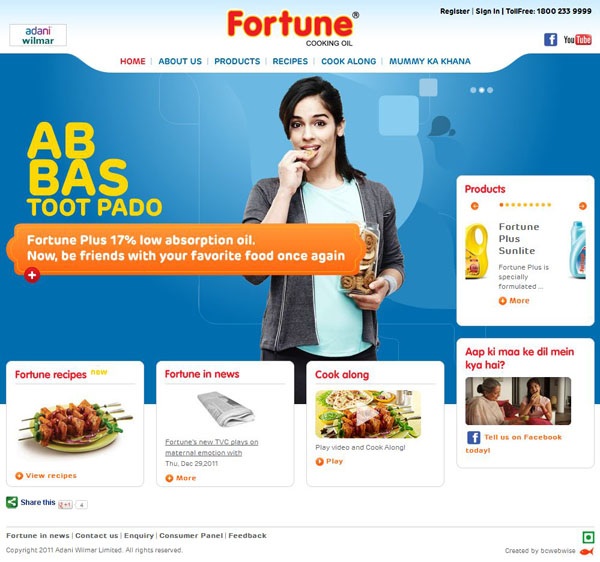
UED for Fortune Cooking Oil If you are a B2C company, then the visual impact, information dissemination, positioning statement, and windows for engagement that you provide for your audience can completely influence the choice they make at the store shelf where your brand hobnobs with competing brands. Adding rich media content, contextual content, using intuitive information architecture, doing usability tests with the actual consumer are all steps to getting your consumer experience right.
- For a B2B company, the impact you make on the website with visuals, information dissemination, positioning statement, can be further enhanced with customer testimonials, case studies, etc. These can actually help your customer make their selection. They may decide to not even call in a multi-vendor bid. If they have to as a process, influencers can create considerable buzz within their company’s evaluation team based on what they have already seen demonstrated about you on your website.
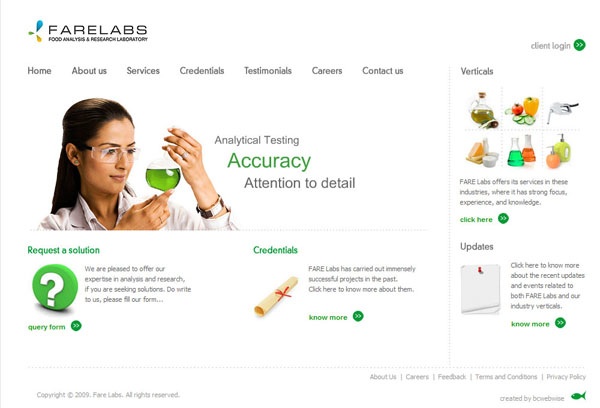
Your Website Is Your Showroom
Window Dressing: One of the key triggers that makes you decide on whether to enter a showroom or not, or choose from an array of showrooms one next to each other is what you can see from outside the store. If the store is not welcoming from the outside, however incredible its products may be, the likelihood of you having entered it is negligible. Exactly the same principles applies for the first landing page of your website.
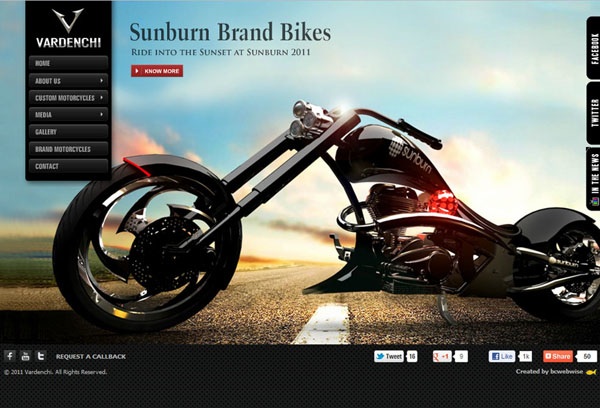
Trained Sales Force: You are comfortable in a store where the sales staff treats you in the ‘contextually’ appropriate fashion. They are there but don’t overwhelm you with their help and assistance, or they are there presenting one engagement ring after the other, and may be much more then you asked for because you want to be showered with the attention at this point in time. Similar contextual information dissemination and engagement windows need to be built on your brand or corporate website.
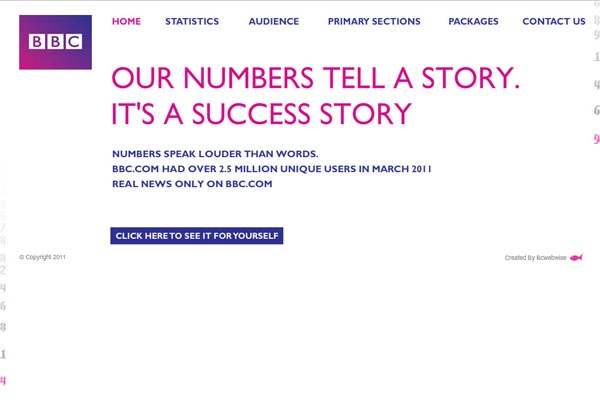
Product Showcase: If its games that kids love, then highlight these with brand placement in them. If it is hair styling then give rich media content they won’t find anywhere else. And if it is just statistics that work, then forget the imagery, and give them the facts, present it with tasteful copy. In other words if you are a company all about services that do not involve a product photograph, explore the key USPs that you can highlight creatively: Team, Offices, Clients, Certifications, etc.
So in the race to address the multiple channels of the digital domain do not forget your website design, and the criticality of consumer experience. Planned consumer experience can help turn your domain into the most cost effective marketing and sales vehicle.
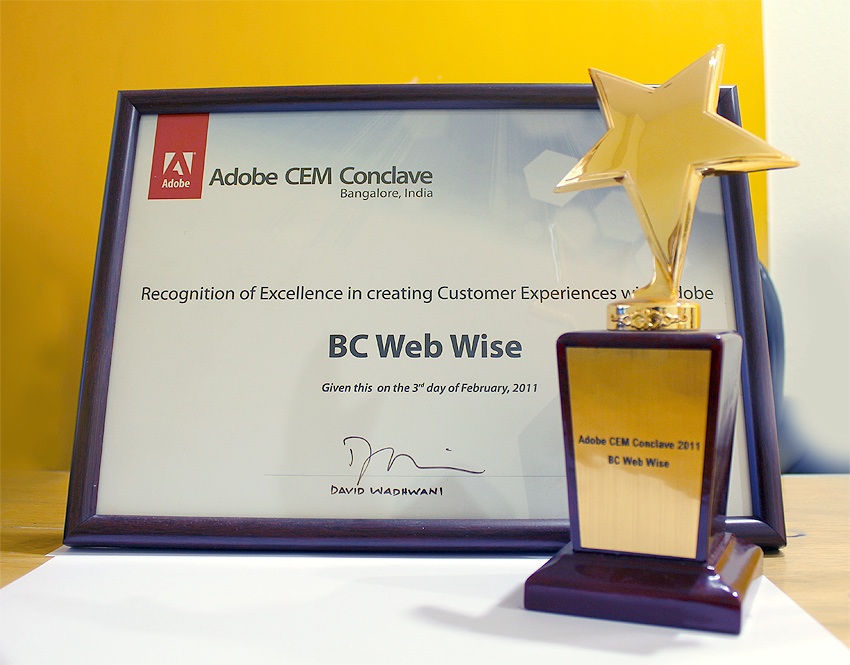
About BC Web Wise & Consumer Experience: In early 2011, Adobe recognized BC Web Wise and awarded us with a beautiful trophy for ‘Excellence in Creating Consumer Experiences’. The other three companies that they awarded with us, were TCS, Infosys and Cognizant. Getting awarded along with organizations that are multi billion dollar companies was the highest honor that we could get, and is one of the most cherished awards we have ever got.

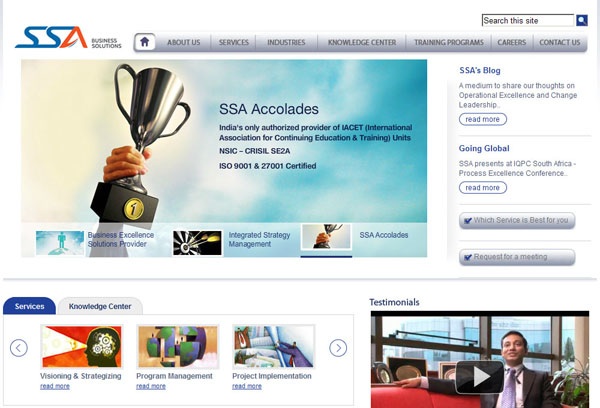
Right,Good to see these useful info here..Thanks a lot for sharing them with us….
Glad to have been of help 🙂
1. Work out what they really want.
Finding out what your customers want is the beginning and end of your marketing efforts. Get this right, and you can make mistakes with the rest of this list and still make sales. Get it wrong, and you will struggle no matter how well you execute the rest.
If you’re a service provider working closely with clients, this is relatively easy – since clients will tell you about their problems, challenges, loves, and hates. They’ll let you know when you’re giving them what they want – and vice versa! So pay attention to what they tell you and use it to improve your service – and develop new offerings.
If you’re selling products or artworks without so much interaction with your customers, it’s a little harder but still doable. Take every opportunity to meet with your customers and talk to them – in ‘real life’ as well as via social media.
Working out what your customers want is an ongoing process that involves trial and error. Here are two questions that can help you get the answers faster:
Which products/services/artworks are my customers most enthusiastic about?
What do they buy from your competitors that you could do better, or with an original twist?
2. Show them you mean business.
When a new visitor lands on your website, what’s their first impression? Does it look professional or amateurish? Up-to-date or neglected? Popular or obscure? No prizes for guessing which qualities are more attractive to buyers.
And do you make it obvious this is a business website, where you want them to buy from you or hire you? They aren’t mind readers, you know!
Don’t say: “Hi, I’m Rachel, welcome to my photography site, I hope you enjoy the pictures!”
Do say: “Hi, I’m Rachel Reynolds, a photographer based in Boston. Welcome to my site – you can browse and buy my pictures in the gallery.”
3. Make your offer crystal clear.
What do you want people to DO when they come to your site? ‘Buy my stuff’ or ‘hire me’ should be at the top of your list. Next up is to subscribe to your blog or newsletter, sign up for a free trial, or do something else that moves them closer to buying.
Make a prioritized list of these actions. For each desired action, you need to make an offer (invitation, call to action).
Particularly if you are selling a complex product or service, you need to make it clear exactly what you can do for your customers, and how it will benefit them. The more specific you are, the more believable your claims, the more of an expert you will appear.
Don’t say: “I’m available for portrait commissions.”
Do say: “I paint Vinyl Art, portraits of musicians and entertainers on vinyl records made by the subject. Instead of Elvis on velvet, think Elvis on an Elvis record.” -http://vinylart.info/who.htm
At this point there’s no substitute for professional standard copywriting. If you’re a confident writer, teaching yourself copywriting skills could be one of the best investments you make. If you can’t write for toffee, or hate the thought of penning a sales page, you should seriously consider hiring a copywriter.
I savour, lead to I found exactly what I was having a look for. You have ended my four day long hunt! God Bless you man. Have a great day. Bye